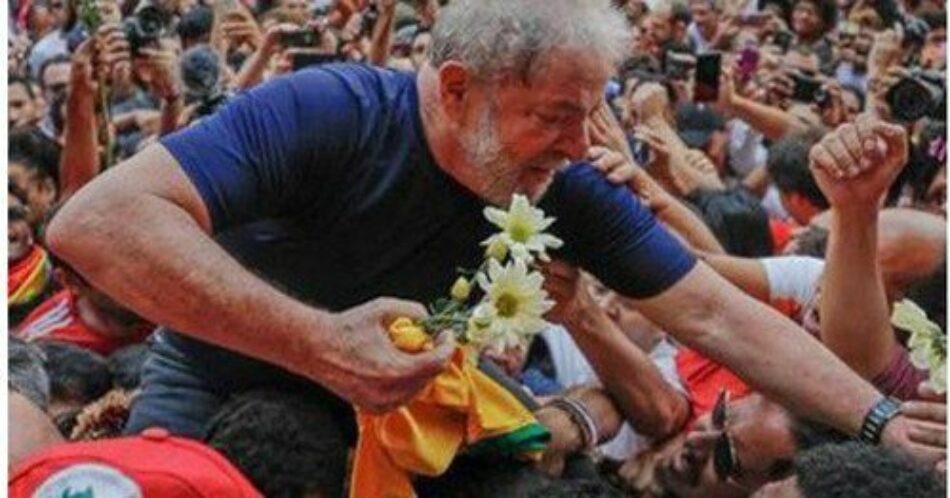Lula: «La injusticia contra mí es una injusticia contra el pueblo brasileño»
Entrevista exclusiva de Granma con Luiz Inácio Lula da Silva, líder del Partido de los Trabajadores de Brasil, por Elson Concepción Pérez, 14 de junio de 2018.

El líder obrero, el hombre que en su etapa de Presidente de Brasil impulsó leyes y planes sociales que permitieron sacar de la pobreza a unos 30 millones de brasileños, al que todas las encuestas lo dan como el favorito por amplia mayoría para ganar las elecciones presidenciales del 2018, Luiz Inácio Lula da Silva, respondió a una entrevista de Granma, cuestionario que le hizo llegar la mano amiga de un brasileño.
La entrevista no pudo ser –por razones obvias– todo lo amplia que desearía este periodista. Sin embargo, la circunstancia de estar preso y haber hecho un aparte en su valioso tiempo para responder nuestras preguntas le aporta un valor agregado, no solo para los lectores cubanos, sino para los de todo el mundo.
En su condición de candidato a la Presidencia de Brasil con el mayor apoyo popular y que todas las encuestas indican como favorito, ¿cómo califica esta persecución y encarcelamiento a los que ha sido sometido?
Es un proceso político, una prisión política. El proceso contra mí no logra apuntar un crimen, ni existen pruebas. Tuvieron que irrespetar la Constitución para arrestarme. Lo que está quedando cada vez más transparente para la sociedad brasileña y para el mundo es que ellos quieren sacarme de las elecciones del 2018. El golpe dado en el 2016, con la retirada de una presidenta electa, indica que ellos no admiten que el pueblo vote a quien quiera votar.
La prisión ha sido, para muchos líderes presos por el simple hecho de luchar por el pueblo, un lugar de reflexión y organización de las ideas para proseguir la lucha. En su caso, ¿cómo encara esos primeros días, ya que se encuentra impedido de entrar en contacto con el pueblo?
Estoy leyendo y pensando mucho, es un momento de mucha reflexión sobre Brasil y sobre todo en lo que ha sucedido en los últimos tiempos. Estoy en paz con mi conciencia y dudo que todos aquellos que mintieron contra mí duerman con la tranquilidad con que yo duermo. Por supuesto que me gustaría tener libertad y estar haciendo lo que he hecho toda mi vida: dialogar con el pueblo. Pero estoy consciente de que la injusticia que se está cometiendo contra mí es también una injusticia contra el pueblo brasileño.
¿Cuán importante es saber que en todos los estados brasileños hay miles de compatriotas a favor de su liberación?
La relación que he construido a lo largo de décadas con el pueblo brasileño, con las entidades de los movimientos sociales, es una relación de mucha confianza y es algo que yo aprecio mucho, porque en toda mi trayectoria política siempre insistí en jamás traicionar esa confianza. Y no traicionaría esa confianza por ningún dinero, por apartamento, por nada. Era así antes de ser presidente, durante la presidencia y después de ella. Entonces, para mí, esa solidaridad es algo que me emociona y anima mucho a permanecer firme.
¿Cómo definir el concepto de democracia impuesto como patrón de la oligarquía para descartar a los líderes de izquierda y que no lleguen a ocupar el poder?
América Latina vivía en las últimas décadas su momento más fuerte de democracia y conquistas sociales. Pero recientemente las élites de la región están tratando de imponer un modelo donde el juego democrático solo vale cuando ellas vencen, lo que, claro, no es democracia. Entonces es un intento de democracia sin pueblo. Cuando no sale de la manera que ellas quieren, entonces cambian las reglas de juego para beneficiar la visión de una pequeña minoría. Eso es muy grave. Y lo estamos viendo, no solo en América Latina, sino en el mundo entero, un aumento de la intolerancia y las persecuciones políticas. Ha ocurrido en Brasil, Argentina, Ecuador y otros países.
¿Qué mensaje envía a todos aquellos que, en Brasil y en todo el mundo, son solidarios con usted y exigen su inmediata liberación?
Agradezco mucho toda la solidaridad. Es necesario ser solidarios con el pueblo brasileño. El desempleo aumenta, más de un millón de familias han vuelto a cocinar con leña a causa del aumento del precio del gas de cocina, millones que habían salido de la miseria están volviendo a no tener qué comer, e incluso la clase media ha perdido empleo e ingresos.
Brasil venía en una trayectoria de décadas de avances democráticos, de participación política y junto con ellos avances sociales, que se aceleraron con los gobiernos del PT, que ganaron cuatro elecciones seguidas.
No han dado el golpe solo contra el PT. No me arrestaron solo para perjudicar a Lula. Lo hicieron contra un modelo de desarrollo nacional e inclusión social. Se ha dado el golpe para eliminar los derechos de los trabajadores y jubilados, conquistados en los últimos 60 años. Y el pueblo está percibiendo eso. Y vamos a necesitar mucha organización para volver a tener un gobierno popular, con soberanía, inclusión social y desarrollo económico en Brasil.
Lula nos pidió agradecer dos mensajes especiales: «Aprovecho esta oportunidad para agradecer los saludos solidarios de los compañeros Raúl Castro y Miguel Díaz-Canel, que me fueron transmitidos por Frei Betto», el mismo amigo que nos hizo llegar las respuestas a esta entrevista.
LULA: The injustice committed against me is an injustice against the Brazilian people
Granma offers readers an exclusive interview with Luiz Inácio Lula da Silva, leader of the Workers’ Party of Brazil by Elson Concepción Pérez, June 18, 2018
The workers’ leader, the man who during his term as President of Brazil pushed for laws and social plans that allowed some 30 million Brazilians to be lifted out of poverty, whom all the polls indicate is the favorite, by a large majority, to win the presidential elections of 2018, Luiz Inácio Lula da Silva, responded to questions from Granma, with the kind help of a Brazilian friend.
For obvious reasons, a personal and more wide-ranging interview with this journalist could not be conducted. However, the fact that Lula took some of his time while imprisoned to answer our questions makes this interview particularly significant, not only for Cuban readers, but all those around the world.
As a candidate for the Presidency of Brazil, with the greatest popular support and all polls indicating you are the favorite to win, how would you describe the persecution and imprisonment to which you have been subjected?
It’s a political process, political imprisonment. The case against me does not fail to point to a crime, nor is there any evidence. They had to disrespect the Constitution to arrest me. What is becoming increasingly transparent to Brazilian society and the world is that they want to take me out of the 2018 elections. The coup in 2016, with the removal of an elected president, indicates that they don’t accept the people voting for whoever they want to vote for.
For many leaders imprisoned simply for fighting for the people, prison has served as a place for reflection and the organization of ideas to continue the struggle. In your case, how are you dealing with these first days, since you are preventing from being in contact with the people?
I’m reading and thinking a lot, it’s a moment of much reflection about Brazil and especially everything that has happened in recent times. I am at peace with my conscience and I doubt that all those who lied against me sleep as peacefully as I do.
Of course I would like to be free and doing what I have done all my life: dialoging with the people. But I am aware that the injustice that is being committed against me is also an injustice against the Brazilian people.
How important is it for you to know that across all Brazilian states there are thousands of compatriots in favor of your release?
The relationship that I have built over decades with the Brazilian people, with social movement organizations, is a very trusting relationship and it is something that I greatly appreciate, because in my entire political career I always insisted on never betraying that trust. And I would not betray that trust for any money, for an apartment, for nothing. That was the case before being president, during my presidency and afterwards. So, for me, that solidarity is something that moves me and encourages me to stand fast.
How would you define the concept of democracy imposed by the oligarchy to exclude leaders of the left and ensure they don’t come to power?
Latin America has experienced its strongest moment of democracy and social gains in the last decades. But recently the elites of the region are trying to impose a model where the democratic process is only valid when they win, which, of course, is not democracy. So it is an attempt at democracy without the people. When it doesn’t turn out the way they want, they change the rules of the game to benefit the vision of a small minority. That is very serious. And we are not only seeing it in Latin America, but throughout the world, an increase in intolerance and political persecution. It has happened in Brazil, Argentina, Ecuador and other countries.
What message do you send to all those who, in Brazil and around the world, are showing solidarity with you and demanding your immediate release?
I really appreciate all the solidarity. It is necessary to be solidary with the Brazilian people. Unemployment is rising, more than a million families have returned to cooking with firewood because of the increase in the price of cooking gas, millions who had left poverty behind are once again facing the situation of having nothing to eat, and even the middle class has lost jobs and income.
Brazil was on a path of decades of democratic progress, of political participation, and together with this, social advances, which accelerated with the governments of the PT (Worker’s Party), which won four elections in a row.
They have not only dealt the PT a blow. They didn’t arrest me just to malign Lula. They did so against a model of national development and social inclusion.
The coup was to do away with the rights of workers and retirees, gained over the last 60 years. And the people are realizing that. And we are going to need a lot of organization to return to a popular government in Brazil, with sovereignty, social inclusion and economic development.
Lula also passed on two special messages: “I take this opportunity to thank compañeros Raúl Castro and Miguel Díaz-Canel for their solidary greetings, which were transmitted to me by Frei Betto”, the same friend who kindly sent us the answers to this interview.


